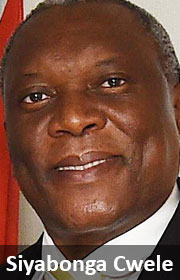 Last month, cabinet approved the national integrated ICT policy white paper, which gives meaning to the constitutional principle of not discriminating against any citizen.
Last month, cabinet approved the national integrated ICT policy white paper, which gives meaning to the constitutional principle of not discriminating against any citizen.
The white paper is an inclusive, overarching policy that covers the ICT and postal sectors. It is a web of interconnected policies that seek to radically modernise society and prepare South Africans for active participation in the inclusive digital economy that is envisaged in the national development plan.
It also about implementing Agenda 2063 as ICTs are a critical success factor for us in attaining those goals.
The white paper includes policies that seek to open up access to the sector for more participants, lower the costs to roll out communications infrastructure and extend modern communications infrastructure and services to all, including those who live in rural South Africa.
There are policies that are aimed at making South Africa a participant in the Internet economy by, among other things, strengthening our research and development capacity. There are also policies that facilitate the uptake and usage of ICT by all.
Government must lead the way because we are the largest procurers of ICT goods and services. Through procurement, we must facilitate the entry of new players. We must support those who develop technologies and applications locally.
We welcome the debates that have been taking place since the gazetting of the white paper and look forward to more robust discussions as we seek to enact laws that will give effect to it.
I understand that spectrum is the oxygen of the telecommunications sector and that the current networks are clogged. But there are other services that also require spectrum.
A lot of comments around the white paper tended to be around the radio frequency spectrum policy and the introduction of a wholesale open-access network.
The white paper defines an open-access network as “a scenario where wholesale access is provided to electronic communications network infrastructure or services on terms that are reasonable, effective, transparent and non-discriminatory”.
The concept of open-access networks is not new when you consider that the Organisation for Economic Cooperation and Development conducted a study on the subject in 2013. That is a lifetime ago in technology terms.
The key question that we need to answer as South Africans is how to we roll out a wholesale open-access network to the benefit of all
The study, titled “Broadband Networks and Open Access”, looked at case studies that included France and Sweden. It explored open-access arrangements in a variety of situations, including in fixed-access networks, mobile networks, Internet exchange points and undersea cables.
The study established the following: “Open-access arrangements are crucial for promoting competition, greater consumer choice and lower prices in markets where it would otherwise be extremely challenging. Permitting new businesses to connect to existing communications networks, for example, is more affordable and less risky than building networks from scratch.”
It also contains the following comment: “It should be noted that open-access agreements have rarely been reached voluntarily, as firms prefer to reach commercial arrangements that are not necessarily non-discriminatory or transparent. Put another way, most open-access policies have been the result of direct or indirect public intervention.”
The study points to the importance of implementing open-access policies through a regulatory regime that “facilitates new investments and drives incumbents to respond in kind, thus producing benefits for the overall market”.
Earlier this year, the US Federal Communications Commission finalised the rules of allocating the 3,5GHz spectrum band on an open-access model — for use by government and the private sector.
Market dominance
The countries that have opted to implement the open-access network model faced similar challenges to the ones we seek to address. The findings of the study suggest that through the white paper, we are following modern thinking in resolving the current challenges that slows the development of an inclusive digital economy.
The policy encourages operators to work together to maintain and roll out infrastructure and facilitates services-based competition. This will help to reduce the uneconomic duplication of communications infrastructure and enable the extension of this infrastructure to underserved areas.
It will also address market dominance and concentration and facilitate competition by imposing cost-based pricing for access to critical telecoms resources.

Spectrum is a public good and we want to use it for the benefit of all. As we allocate spectrum, we must identify what are the critical factors that will help us implement the policy successfully.
It is possible that we can use ICT to encourage vibrant economic participation by all. We need to grow the industry and foreign direct investment and partnerships are important.
South Africa used to be a competitive ICT manufacturing country. These days, we import things that we can manufacture. We also have incentives for exports.
Government’s black industrialists programme talks to localisation of the sector. I encourage the sector to pursue this programme and demonstrate to government that the sector can create jobs.
Another area of growth is e-commerce. Two years ago, the sector was worth R2bn and now it’s around R9bn. The sector will continue to grow because South Africans want convenience. Companies that will succeed are those that address consumer choices. Let’s innovate and grow the industry. Don’t think just local, think of providing solutions for the continent.
The policy intent is certainly not to kill the industry but to make it accessible to more entrepreneurs who could bring competition that will give consumers more choices at lower prices.
In South Africa, we also have examples of successful open-access models in the telecoms sector. Most of you who live in urban areas would be aware that in recent years your streets have been dug up as companies lay fibre pipes. Now, new service providers are leasing capacity on those pipes and are offering you fibre to the home, in competition to existing players. Mobile operators have invested in this open-access fibre rollout. They have done the same in undersea cables.
There is evidence that developed and developing countries are embracing open-access models and the local sector has done the same.
The key question that we need to answer as South Africans is how to we roll out a wholesale open-access network to the benefit of all. We must do this because the Internet has emerged as a great developmental tool. We cannot afford to create new digital divides by leaving some citizens behind.
The policy choices have been made. They won’t be changed because that will cause investor uncertainty. But we will continue to engage as we enact laws and implement the policy.
- Siyabonga Cwele is minister of telecoms & postal services
- This is a slightly shortened version of a speech that Cwele delivered to a symposium on the national integrated ICT policy white paper in Midrand on Monday




